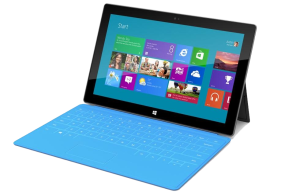Scratching the Microsoft Surface
 This week, in a move that surprised no one, Microsoft released their first ever PC, the Microsoft Surface. There are lots of websites out there who provided in-depth coverage about the announcement, so instead of rehashing what they had to say, I'll just link to them instead.
This week, in a move that surprised no one, Microsoft released their first ever PC, the Microsoft Surface. There are lots of websites out there who provided in-depth coverage about the announcement, so instead of rehashing what they had to say, I'll just link to them instead.
What does interest me is why Microsoft is doing this now. We've had 2.5 years of the iPad, we've had a year and a half of Android tablets, the HP TouchPad and RIM Playbook have both flopped, so why would Microsoft, so late to the game, make this device now?
 To illustrate what I think Microsoft really believes this device to be, I think this image shows it best... its an upside down laptop. That may sound like a very over simplified summary, and it is, but it is also an interesting way of viewing the situation Microsoft finds themselves in with the modern computing landscape.
To illustrate what I think Microsoft really believes this device to be, I think this image shows it best... its an upside down laptop. That may sound like a very over simplified summary, and it is, but it is also an interesting way of viewing the situation Microsoft finds themselves in with the modern computing landscape.
Microsoft has been in the hardware business a long time, something they touted in their introduction, but never have they made a PC class device. That admission, that the Surface is a touch-enabled PC, as opposed to Apple's belief that tablets are really traditional PC replacements (at least for a majority of common uses).
The one thing that Microsoft has done really well over the last two decades is to protect its monopoly on the desktop computing market. If Apple's vision of computing becoming inherently mobile comes to fruition, Microsoft would be relegated to a niche market, just like Apple was only 15 years ago. If Microsoft had not done something soon, there is the possibility they would be so far behind they would not have been able to recover from such a loss. Apple recovered by falling back on its legacy of disruption and focus, a legacy that Microsoft has only had in its legal department.
But its not necessarily a bad thing to view the Surface as an inverted laptop, especially the Windows 8 Pro version of it that will be released later this fall. Many sites have noted that the Surface isn't so much an iPad competitor but is more of a way to stop the iPad's penetration into the enterprise, an area that Microsoft has traditionally dominated and Apple hasn't really even participated. The iPad made its way in through the board room, playing hop-scotch around corporate procurement processes. That had to make Microsoft nervous, because if Apple could do it with the iPad, what would stop them from doing it with more traditional PCs.
With that in mind, the Surface feels to be not so much something really new but something meant to fight off something that really was really new, namely the iPad. The most obvious way to see this was the multiple flavors of the device itself and the multiple keyboard options released.
Not only will there be an iPad-like competitor, there will also be a version of the Surface that is very much like a traditional PC. Consider this PC like version to be an upside down NetBook, but with a decent processor, video card and a touchscreen. Microsoft also announced two different cover/keyboard combinations, one with mechanical keys and another that sensed keystrokes with an accelerometer.
All of these things were novel, some were even very innovative, but its like Microsoft wasn't exactly sure what they wanted this device to be or how exactly they would go about selling it. Compare that with how Apple makes very clear, very defined lines between their products. Many people say that Microsoft is providing more choice than Apple, and I think that is true to an extent, but its also true that Microsoft just couldn't make a clean break with their past. They felt they had to give something that their enterprise customers would want and could control.
Will the Surface be a success? Probably, at least to people who want a tablet but have an anti-Apple bias or needs Apple has no desire to meet. It does look to be the best non-Apple produced tablet that has so far been announced. Personally, I can't wait to have the opportunity to touch and use one, if for no other reason than to see how it really does stack up to an iPad. I liked Windows Phone 7.5, so this should be something I enjoy using. More competition, especially when it is real competition, is always a good thing.